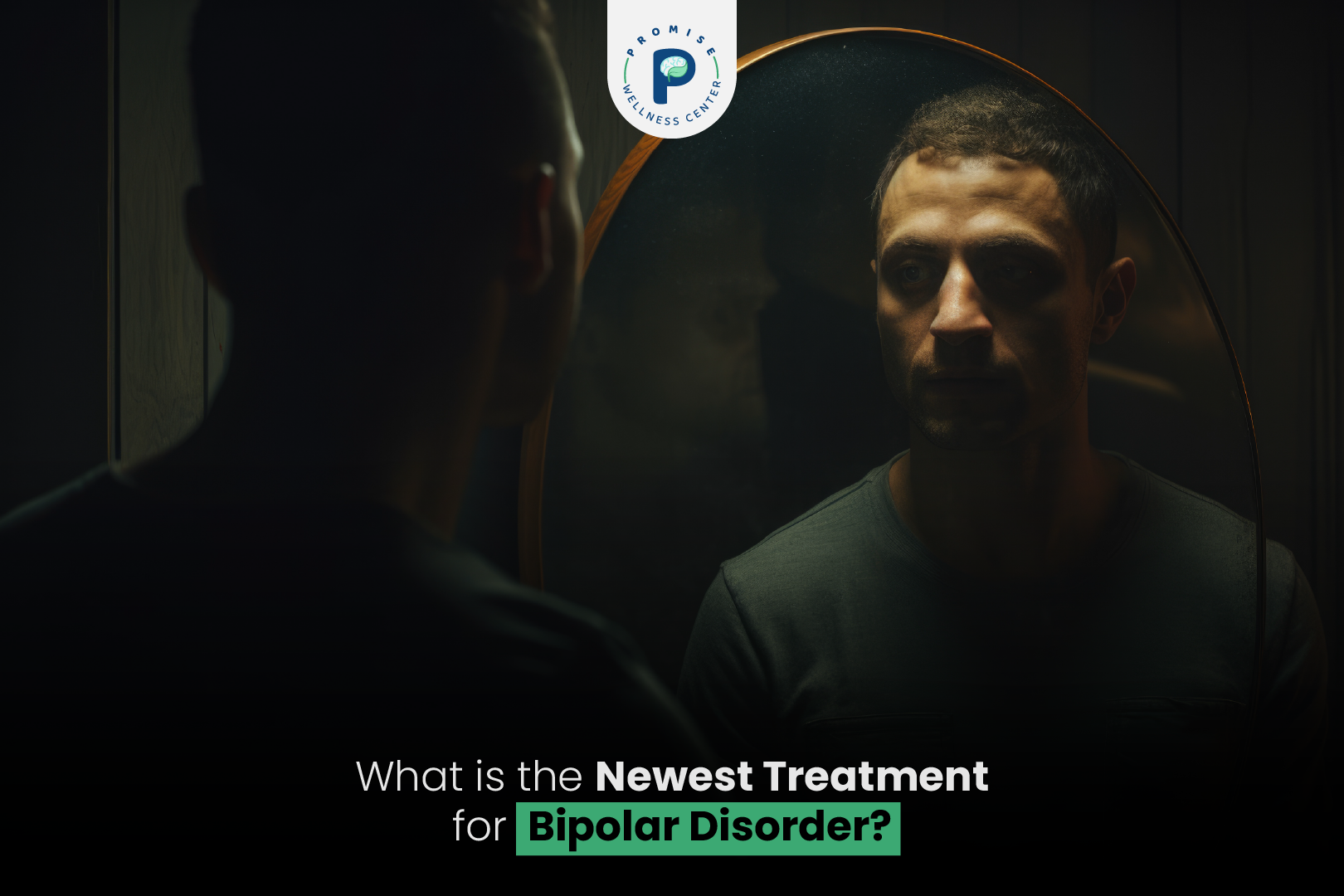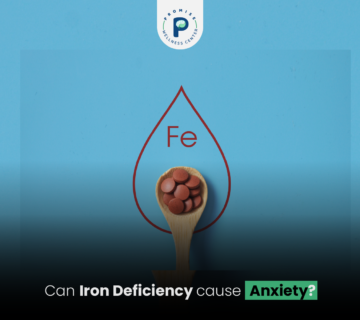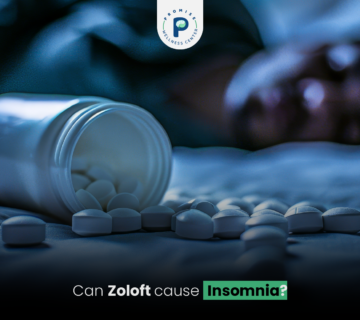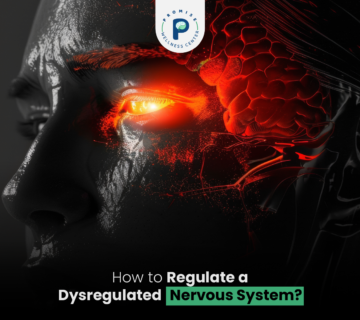So, what is the newest treatment for bipolar disorder? Bipolar disorder is a common mental health issue. It affects many people worldwide. The signs are intense mood shifts. There are emotional peaks (mania or hypomania) and valleys (depression). This disorder is hard to control. It is especially tough for those who resist common treatments.
This blog reveals the most recent gains in tackling this intricate illness. We’ll look at how these strides bring hope to those with treatment-resistant bipolar disorder.
Promise Wellness Center leads in bipolar disorder treatment. Our innovative approaches can help you. Don’t wait – contact us today for expert care.
Faces of Bipolar Disorder
It is vital to understand bipolar disorder as we explore new treatments. It has different forms, like Bipolar I, Bipolar II, and Cyclothymic Disorder. Each variation carries distinct signs, ranging from mild to severe.
People usually manage bipolar disorder with mood-stabilizing drugs, antipsychotic meds, and therapy. Yet, not all find success with these routes. This is especially true for those with treatment-resistant bipolar disorder. This type chooses not to acknowledge the usual treatments.
There is a growing search for better treatments. It is urgent for those with treatment-resistant bipolar depression. Their condition does not improve with typical solutions.
Biomedical Therapy
A promising advance in mental health is biomedical therapy. But, what is biomedical therapy? It’s a therapy for mental health problems. It aims to fix the brain’s chemical imbalances. For illnesses like bipolar disorder, here’s what biomedical therapy covers:
- Electroconvulsive Therapy (ECT)
ECT is an old method that’s recently improved. It’s now safer and works better for treatment-resistant bipolar depression. It releases tiny electric waves into the brain, causing a quick seizure. This changes the brain’s chemistry, reducing symptoms.
- Transcranial Magnetic Stimulation (TMS)
TMS is a process that doesn’t involve surgery. It uses magnetic fields to stimulate brain nerve cells. It has made waves in treating treatment-resistant bipolar disorder. It focuses on the brain parts that control mood.
Ketamine Infusion Therapy
An interesting new progression in treating bipolar disorder is Ketamine Infusion Therapy. Initially utilized as an anesthetic, ketamine is now noted for quickly reducing symptoms of depression. This is particularly useful for bipolar cases that resist traditional treatment methods.
Ketamine functions unlike usual antidepressants. It targets the brain’s glutamate system, important in controlling mood. Common treatments can take weeks to show results. Ketamine could offer relief within hours. This makes it a potential bipolar miracle cure for those who haven’t benefitted from other methods, ketamine might just be the long-awaited miracle for managing bipolar disorder.
Ketamine Infusion Therapy is leading the pack. It’s like a fresh ray of hope for people who find no relief in other treatment-resistant bipolar disorder. This therapy usually happens in a monitored medical environment. Here, patients get a mild ketamine infusion. Doctors watch the results closely. They adjust the treatment based on the patient’s reaction.
Emerging Therapies and Bipolar Disorder Research Studies
Bipolar disorder care is always improving. This is due to ongoing research into better ways to control the disorder. Here are some of the latest treatments being studied:
-
Deep Brain Stimulation (DBS)
DBS is a method that puts a device in the brain. It sends electric waves to precise areas. Mainly, it aids people with ailments such as Parkinson’s disease, a nerve-related issue. Newer studies suggest that it might be handy for those people battling bipolar disorder which is hard to treat.
-
Psychedelic-Assisted Therapy
Researchers are checking out mind-bending substances, like psilocybin, for healing the mind. They might help with mental issues, even bipolar disorder. Although these studies are just starting, early clues look hopeful. They hint that these odd substances might help people with severe bipolar depression.
The Importance of Therapy Time in Treatment Plans
The latest medical advances are promising. But we mustn’t overlook the role of therapy time in controlling bipolar disorder. Psychotherapy is still a key treatment. It helps people cope, build bonds, and manage stress.
The best therapies for bipolar disorder are CBT, DBT, and family-centered therapy. These therapies go perfectly with biomedical treatments. They create a complete plan to manage the disorder.
New cures, like Ketamine Infusion Therapy, are great. But, therapy time is vital in any care approach. Psychotherapy, both regular and custom-designed, can help a lot. It can improve the success of treatments for resistant bipolar disorder.
The Concept of “Is Such a Mood” in Bipolar Disorder
Bipolar disorder is often misunderstood. Phrases like “is such a mood” can trivialize the condition’s severity. That’s not the case. Bipolar disorder goes beyond mood swings. It’s a complex mental health issue. It needs a detailed, personalized treatment plan.
People with treatment-resistant bipolar disorder seek life-altering treatments. Biomedical therapy, research on bipolar disorder, or a mix of treatments can help. They may improve life.
Conclusion – Hope for the Future
What is the newest treatment for bipolar disorder? It’s found in the persistent progress of medical and psychological strategies. There’s hope for those with stubborn bipolar disorder. This is true for both Ketamine Infusion Therapy and new studies on the disorder.
Looking ahead, it’s vital to back up ongoing studies and delve into fresh healing methods. Be it through biomedical treatments, innovative psychotherapies, or emerging treatments such as psychedelic-assisted therapy, the aim is to provide a groundbreaking solution for bipolar disorder capable of changing lives.
Ultimately, handling bipolar disorder needs a mixed approach. This includes medical care, therapy sessions, and a solid knowledge of the disorder. People with bipolar disorder can get help. They should learn about new advances and team up with doctors. This will let them enjoy meaningful lives.
FAQs
What is Ketamine Infusion Therapy?
It’s a new therapy. It works fast to help those with bipolar disorder not responding to usual treatments. It acts on the glutamate system of the brain.
Is such a mood meaning in the context of bipolar disorder?
The phrase “is such a mood” is commonly used to convey relatable emotions. However, it may belittle the illness to discuss bipolar disorder. Bipolar disorder leads to extreme mood swings. These need care and should be taken seriously.
How does Ketamine Infusion Therapy work?
Ketamine Infusion Therapy acts fast. It attacks the brain’s glutamate system. It quickly relieves depression in people with treatment-resistant bipolar disorder. The treatment is given in a monitored medical zone. Most feel its impact in mere hours.






No comment